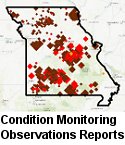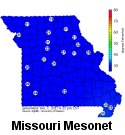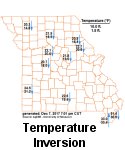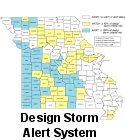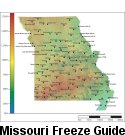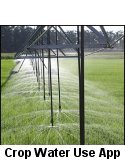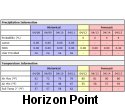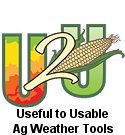
Missouri sets two-year precipitation record
with 106 inches, more possible
Duane Dailey, MU Cooperative Media Group
"Unprecedented wetness," said Pat Guinan in a two-word summary of the last two years of Missouri weather. The University of Missouri Extension climatologist said that by mid-December, average precipitation topped 106 inches for 2008 and 2009, with more snow is in the forecast.
"Last year was the wettest year on record with more than 57 inches of precipitation. So far this year, 49 inches has fallen," said Guinan, who tracks weather for the MU Commercial Agriculture Program.
Guinan said in 115 years of weather records, the only time when back-to-back years were almost as wet was in 1927 and 1928, when 102 inches of precipitation fell.
Missouri's average rainfall is 41 inches per year.
"I've been here 20 years, and this was the first two consecutive years with no drought alerts," Guinan said. "Missouri is a big state, more than 400 miles from northwest to southeast, and we usually have a drought somewhere every year."
An unusual feature of this weather pattern was persistent above-normal rainfall from month to month.
Farm crops responded with two years of record-setting yields, Guinan said, but rain set back planting in both years and delayed harvest this year.
"Exceptional rainfall in October, one of our drier months in Missouri, stopped harvest this year," he said. "November warmed up and dried to allow harvest of most of the crop. However, heavy snows in December stopped the late harvest in northwest Missouri, so some crops are still in the field.
Rainfall in both years was accompanied by lower temperatures.
"I just discovered this in the weather records," Guinan said. "The four-month period from July to October 2009 was the coolest on record." Last year was the coolest year since 1996.
The soil moisture profile is full in most areas. "By the fall, Missouri soils normally need replenishment with rains. Not this year. We'll go into the next crop year with plentiful moisture reserves in the soil and in ponds and lakes."
The unusual weather created winners and losers, Guinan said. Irrigation farmers did not have to apply much water this year. Haymakers faced delays in baling and wet hay reduced feed value for livestock.
Lawn care providers had a good year, Guinan added. Lawns needed mowing weekly throughout July and August. However, air conditioning salespersons remained idle.
Recreation also was affected with canceled baseball games and lower attendance at swimming pools.
Will 2010 be another wet one? Guinan said it's hard to predict. "Based on historical records it's highly unlikely to have three exceptionally wet years in a row."
But he didn't expect to see a second unusually wet year, either.
Guinan oversees a network of automated weather observation stations across the state. Anyone with Internet access can check current and historic conditions, including soil temperatures, by going to http://agebb.missouri.edu/weather/stations/ and clicking on the nearest location. Of the 28 sites, 17 give real-time weather updates every five minutes.


